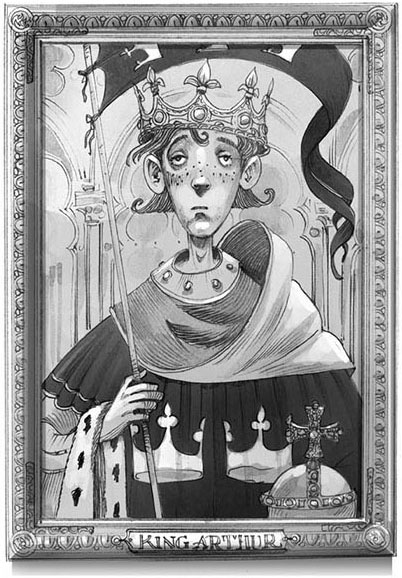
The School for Good and Evil 3-book Collection: The Camelot Years (Books 4- 6)
The two girls turned and saw the three witches looking back at them, chest-deep.
“There’s someone out there,” said Hester.
Sophie stepped forward, squinting past the witches across the lake. Then she saw it: a hundred yards away, a silhouette hunched on top of the water. She couldn’t see whose it was. She couldn’t even tell if it was man … animal … monster.
But whatever it was gave her a dark feeling.
“I’ll go—” Agatha started.
“I’ll go too,” Sophie said without thinking, clasping Agatha’s wrist and dragging her past the witches and Hort, who’d rushed to follow. The icy water knifed through Sophie’s dress as she swam, but she didn’t make a sound nor stop swimming, her breaths achy and shallow.
But then something curious happened.
As the two girls swam farther, Agatha sank like the others, down to her neck. But Sophie didn’t sink at all. Her body started floating, higher, higher, magically sloughing off water, until suddenly she was walking on top of the lake as if it were solid ground.
She looked down at Agatha, dumbfounded.
Agatha seemed equally stunned, as did the rest of the crew, but there was no time to ask questions.
“Go,” said Agatha quickly. “But be careful.”
Sophie swallowed hard. Then she kept walking.
The lake felt rubbery under her heels and baffled fish ogled her from beneath the surface. Under dreary skies, the figure ahead remained cloaked in shadow as Sophie grew closer, closer. She could see its stooped back, wrapped in soaked gray robes.
The ominous churning in her stomach deepened.
“Hello?” she called out, inching nearer.
No answer.
From behind, the figure had scanty knots of white hair, a shiny skull gleaming through.
“Can you hear me?” Sophie asked.
Still nothing.
“I’m here on behalf of King Tedros of Camelot,” Sophie rasped, mouth dry. “We’re looking for the Lady of the Lake. We need her help burying our friend in King Arthur’s grov—”
An old hag spun to face her, milk-white flesh hanging over bones and ruined with warts. Her teeth were rotted away and her coal-black eyes and thick peeling lips hung open in a foul, empty gape.
Sophie ate her own scream and stumbled back, bracing to run—
“Wait,” the hag said.
Sophie froze.
The voice was low and husky … and beautiful.
It was a voice she knew.
Sophie inched back around. “It’s … you. You’re the Lady of the Lake—”
“I’m sorry for not letting the others see me like this, but they wouldn’t understand,” the Lady of the Lake said softly. “You are the only one who knows what it’s like to lose who you are. Except you found your way back to your true self. I never will.”
“This is permanent?” Sophie said, staggered. “But—but I saw you! Merlin brought us here to hide us in your waters. You were beautiful and magical and powerful! You didn’t look like … like this. …”
The Lady sagged deeper, glancing away. “He said he loved me … that if I protected him, he would save me from my eternal loneliness … and I believed him.”
“Chaddick?” Sophie said. “But he—”
“No,” said the Lady, her voice catching. “Not him.”
“Who, then? And what does love have to do with—”
But then Sophie remembered what the beaver had said when they started their tour … a tale of how the Lady of the Lake came to be. …
“You kissed someone,” Sophie breathed. “You lost your powers. … It’s why the gates to Avalon are open. …”
The Lady’s eyes were bloodshot and wet. “I thought he’d take me away from here. That’s why I gave him shelter.”
Sophie’s heart started hammering. “You kissed the Snake? You gave up your immortality … your magic … to kiss a monster? Do you know what he’s doing in the Woods? Do you know what he did to our friend—” She caught herself. “Wait a second. If you kissed him, that means you saw him. Without a mask. You know who he is—you saw his face—”
“And it was beautiful,” the Lady said, beginning to cry. “I know you won’t forgive me. For letting your friend die. But I had no choice.”
Sophie stared in horror. “You watched Chaddick get killed … and you didn’t help him?”
The Lady sobbed harder.
Blood scorched through Sophie’s veins. Once upon a time, she too had been willing to commit any Evil for love. But this was Excalibur’s maker! This was Good’s great defender!
“You watched him die! For a stupid kiss?” Sophie seethed. “You vowed to protect Camelot forever! You vowed to protect its king!”
“It’s not that simple,” the Lady stammered into her hands. “I—I—I had to protect him. Even Merlin would understand. I had no choice.”
“You keep saying that! I had a choice. You had a choice. We all have choices! And you let a boy be murdered inside Avalon! Why? Because the Snake was pretty?” Sophie snarled. “Chaddick was the liege of King Arthur’s son. Chaddick was Tedros’ knight. That is your first loyalty—”
“No,” said the Lady. “My first loyalty is to the king.”
“And Chaddick was the king’s best friend,” Sophie spat. “A king you promised to defend until the end of time. Chaddick had Tedros’ trust! Chaddick had Tedros’ faith! What does a Snake have?”
The Lady of the Lake slowly lifted her head. The light had gone out of her eyes, replaced by a cold, dead glare.
“He has Arthur’s blood,” she said.
Sophie bleached white, the voice ripped out of her. “Wh-wh-what?”
“I’ll take care of your friend as you ask,” the Lady said stonily, turning back around. “It’s the only power I still have.”
Sophie couldn’t breathe. “But—but—”
The Lady of the Lake vanished.
Shaking, Sophie whirled to the shore and saw Chaddick’s body vanish too. And all that was left in her blurred, darkening vision was Agatha in the water, flailing towards her as if her friend knew something had gone terribly, terribly wrong.


TEDROS
Like Father, Like Son
Tedros was dripping blood all over the castle and he had no idea how to stop it.
It wouldn’t have happened if he’d just stuck to the routine.
He’d gotten up at half past four to exercise in King’s Cove, but as he’d snuck his way to the basement pool, he sensed that festering dread in his stomach: the dread he’d felt ever since Agatha left a week ago.

He’d lied to Lady Gremlaine and anyone who’d asked about the future queen, saying she’d suffered a bout of homesickness and taken the Igraine to Woods Beyond to see some old friends. Luckily, the newspapers hadn’t reported any sightings of her, so he’d held firm to his story, insisting she’d return any day. He couldn’t admit the truth: that Agatha was on a quest to save his kingship, while he stayed behind like a lady-in-waiting.
On their last night together, Merlin had told them their friends’ quests were all failing and that Tedros’ own failed coronation might be part of a bigger story. Any real leader would have instantly set sail for the Woods to find this story … to find the villain behind it … but Agatha had insisted she take his place and he’d gone along with it because he was afraid to leave Camelot without a king.
At the time, he was sure that remaining at the castle was the right decision. But ever since Agatha had left, he’d been having dreams about his father again, silently glaring at him with those harsh blue eyes, eyes that Tedros had gouged out of his statue in order to stop these dreams. So why did he keep having them? Was it because his father would have never let Guinevere hijack his quest the way Tedros had let Agatha? No matter how dicey the situation at home, his father would have forcefully addressed the masses, explained the threat that faced them all, and convinced his kingdom to await his return.
Tedros had done none of those things. Instead, he’d helped Agatha escape like some piddling sidekick, distracting two guards on the bridge while Agatha boarded the Igraine with Willam, silently turned it invisible, and went off to sea.
First he’d almost gotten his mother and Lancelot killed at his coronation by ignoring everyone’s advice. And now he’d put his future queen in danger by passing off his own quest to her. Both times he’d thought it was the Good thing to do. But why did Good things keep turning bad?
Tedros’ mood spiraled as he padded down the Gold Tower stairs in his black socks. For the last few days, he’d hardly been able to focus on his royal duties and kept hounding guards to see if any letters had arrived. The guards already had little respect for him, given his botched coronation and constant deference to Lady Gremlaine, but now he’d been hearing them gossip that instead of a real king they’d gotten a love-whipped pup. (That idiot Pollux had encouraged them before Tedros had him fired.) This was his comeuppance, of course: he’d spent the last six months ignoring Agatha while she was with him and now that she was gone, all he could think about was when she’d be back.
He quickened his pace towards the basement, vowing to lift extra heavy today. He always felt better about himself after a punishing workout. …
Except now he was obsessing over why he hadn’t received any letters from her. It took a day or two at most for a courier crow to deliver a note and Agatha had taken the new crow that Camelot had finally saved enough to buy. So why hadn’t she written?
Magic was no use in finding her either. He’d been crap at spells at school, preferring to win battles with a sword, so he’d plundered Merlin’s chamber, searching for a crystal ball or something that might help him pinpoint Agatha in the Woods. No luck. He’d even cast a locating spell out of the only one of Merlin’s spellbooks he could actually read, but the first time he tried it he’d summoned a bowl of grapefruits from the kitchen and the second time he’d made all of Agatha’s undergarments float around the castle for hours before guards had to shoot them down with bows and arrows.
Tedros stopped outside the Gymnasium in full panic. Where was she? Was she safe? Was she even alive? He pressed his forehead to the wall and struggled to breathe. First his mother and Lance sent off. Now his princess too. Even Merlin had disappeared again—though according to the Royal Rot, there’d been a sighting of him near the School for Good by an Ingertroll who insisted Merlin was having secret trysts with Professor Dovey in her office. (Tedros was so desperate for news of Agatha he’d succumbed to reading trash, only to stop when he saw the Rot had started labeling him “the so-called ‘King.’”)
He’d felt so alone after the coronation.
But now he had no one he trusted in this castle anymore.
Now he was truly alone.
Even worse, as he scoured the newspapers, Tedros saw it wasn’t just Camelot or his friends’ quests that were in trouble. All the kingdoms in the Woods were plagued by mysterious attacks, just as the letters he’d received from the leaders of these realms had attested. The selfish part of him was comforted that other leaders were having just as hard a time as he was. But these kings and queens from both Ever and Never lands were calling upon Camelot—on him—to take the lead in building a Woods-wide coalition and rooting out those responsible for the violence. It’s what Tedros’ father had done when wars between Good and Evil had raged out of control, threatening the Woods. And it’s what ultimately killed him: sapped and impaired by his drunken spells, Arthur had still ridden into battle at the Four Point to forge peace between warring sides and paid for it with his life. Despite Tedros pleading with his father not to go. Despite Tedros begging him to stay home as the king put on his armor.
Perhaps this was one of the reasons why Tedros now ignored these calls for help from other kingdoms and refused meetings with any of its leaders. But the new king also had no help to offer them. Camelot had no money, no knights (Chaddick was still missing), and no army. Plus, Camelot had yet to be attacked like the rest of the kingdoms and its people didn’t seem to care about what was happening in realms beyond its own. Camelot could no longer be the Woods’ policeman. They were too busy with their own problems. Like growing poverty and a bankrupt treasury and rising crime—
And a so-called king.
Tedros’ eyes opened. Looking past the wall, he could see Excalibur’s empty case lit up by gem-blue moonlight.
That sword.
Everything, everything, everything was going wrong because of that sword.
Tedros never made it to King’s Cove. He’d turned back and gone straight to the Blue Tower balcony, dismissed a listless guard, and launched himself at Excalibur once more with no other strategy than beating out his own fury … until he wrenched the hilt so brutally he split open a blister on his left hand.
Now blood was spurting off his palm, trailing him everywhere like a shadow.
He hustled through the Blue Tower, past the famous Map Room, where the Round Table had once met, but now lay cobwebbed and dormant. He could hear worried stewards calling to each other, having seen his blood. He didn’t want to talk to them. He didn’t care if they thought he was wounded or dead. He wanted it to be like school, where he could lock himself in a dorm room or bathroom to be alone and if he missed class, he’d be punished with detention or kitchen duties, neither with any real consequence.
His father had been like this after his mother left. Arthur would slip off without a word and shut himself in the White Tower guest room, to which the king had the only key.
It was where Tedros was headed now.
Merlin was right. Maybe I’m more like Dad than I thought, Tedros thought mordantly.
He could hear his stewards filing into the White Tower, but he was already upstairs, gliding in his socks towards the door at the end of the hall. He pulled out his cramped key ring, finding the gold-toothed key next to a small black one, slipped it into the lock, and swung into the room, latching the door behind him.
The room was dark.
He slid down and plopped on the warm marble, feet splayed in front of him. Blood leaked from his hand onto the skin of his thigh. He stripped off his shirt and wrapped it around his palm like a tourniquet, but that only seemed to make it bleed more. Out of ideas, he thrust his hand in the pocket of his gym shorts and leaned against the door.
The room smelled like musk and earth and sweat. His father had it built as a private guest suite that he could invite his most personal friends to stay in, but Arthur had never used it for guests as far as Tedros knew. His father didn’t even allow maids in this room when he was alive, let alone his wife or his son—though Tedros had broken in once as a child, having picked the lock during a game of hide-and-seek with the fairies. When the king found out, it was the one and only time his dad had given him a thrashing.
It’s why Tedros hadn’t come back to this place before today.
It reminded him of his father’s disappointment in him.
Using his good hand, Tedros lit his fingerglow like a torch, suffusing the room with soft gold. It still looked the same as it had then: a patterned brown-and-orange rug, a sunken leather sofa, and a modest bed in the corner. It didn’t seem royal at all, let alone fitting for a “guest suite.” Felt more like something you’d find at a seedy Netherwood inn, Tedros thought, scanning the bare beige walls with his glow. Why had his father built a private room so common and far away from the better parts of the castle? A guest room that guests never used—
Two green eyes speared through the torchlight. Tedros lurched back, bashing his head against the door.
Reaper moseyed out of the shadows, batting at fleas.
“Oh, it’s you,” Tedros grumped, rubbing his skull. He felt woozy, though he didn’t know whether it was because of the head bump or his hand, which was still spewing a profuse amount of blood. “How’d you even get in here?”
Before Agatha left, he’d told her to take her unholy cat with her, but she’d brushed him off. “Someone has to watch over you,” she’d quipped.
He’d assumed it was a joke. This was the cat that had bitten him, spat at him, peed in his shoes, and once carved heathen symbols into his bathroom mirror. But now that Agatha was gone, the heinous little imp had been following Tedros everywhere he went and even sleeping outside his chambers.
Reaper prowled closer and poked at Tedros’ injured hand with his paw, nudging it out of his pocket. Grunting ominously, the cat sniffed the blood-soaked bandage. Then he climbed on Tedros’ thigh and slashed the cloth open with his claw.
“Hey!” Tedros said.
But now Reaper seized Tedros’ hand in his mouth, tongue to his skin, teeth starting to sink in—
Tedros kicked him hard, sending the cat flying into the wall.
“You little cretin,” he gasped.
Reaper hobbled away whimpering and slunk under the bed in the corner.
Shaken, Tedros studied his hand to see the damage—
“Huh?”
He lit it up with his glow.
His hand wasn’t bleeding anymore. And the wound looked … smaller.
Slowly, he lifted his head and saw Reaper’s dim, wet pupils under the bed frame.
“You were trying to help me, weren’t you?” Tedros asked. “That’s why you’ve been following me all week. You’re watching over me. Just like Agatha said.”
Reaper hissed weakly and receded into darkness.
Tedros lay on his bare stomach at the foot of the bed and peeked underneath. “I’m sorry, little fella. I’m the cretin, not you. I can’t do anything these days without hurting someone. Not even a cat.”
He rolled onto his back. “I can’t do this anymore. I can’t be a half-king. My people don’t deserve a half-king. But how can there be order and progress when I can’t prove I’m fully king?” He roared in frustration and slung his keys at the ceiling, cracking the plaster. “I’m Arthur’s son! It doesn’t matter what Agatha finds in the Woods. It doesn’t matter what’s happening to my classmates. This is Camelot! The crown is mine. It’s always been mine. So why won’t that cursed sword move?”
“I never did think that girl was the homesick type,” a voice said.
Tedros sprung up to see Lady Gremlaine’s shadow in the open doorway.
“But then again, I never took you for a liar,” she said, glaring at him.
“I came here to be alone,” he retorted, eyeing his keys on the floor. “I thought the king had the only key.”
“He does,” Lady Gremlaine replied. “Only he forgot to lock the door.”
Tedros stared at her. “But I did lock it—”
“Shall we walk?” his steward said, holding open the door. “The Treasury Master wants to see you, you’re hardly dressed and bleeding, and to be honest … I’m not particularly fond of this room.”
“I don’t make it a habit of lying, but where Agatha went is between me, her, and Merlin,” Tedros asserted.
“So you met Merlin too?” frowned Lady Gremlaine, clacking ahead into a big, circular white hall.
“I told you. I don’t care who my father banished—”
“Your caring is irrelevant. Until your coronation is sealed, you cannot withdraw your father’s decrees. Not Merlin’s banishment, not the bounty on your mother’s head.”
“Look, there are things happening you wouldn’t understand,” said Tedros, shirtless and shoeless as he chased her lavender silhouette. “You’re my steward and here to help me with whatever I ask. Anything outside of that is my domain.”
“I see,” Lady Gremlaine said, facing him. “So what you’re telling me is even though I was your father’s right hand, even though you’ve asked me to supervise your every decision, and even though I’m the only reason this kingdom is in one piece … you still don’t trust me.”
Tedros couldn’t meet her eyes.
They were standing on a floor of cracked mosaic that depicted the Camelot seal. (Given his crap morning, Tedros found it fitting he was straddling Excalibur’s blade.) The circular walls were covered in dozens of framed paintings, reminding him of the Legends Obelisk at the School for Good, decorated with portraits of famous alumni. He’d been in this hall only a few times as a child, since the White Tower was far away from the others and used mostly for knights’ meetings, arms-making, and staff quarters. Tedros had never paid much attention to the walls back then, but now one of the paintings caught his attention, since unlike the others, it had no other paintings near it. He stepped towards it, eyes wide. …
“It’s me.”
He was wearing his father’s coronation robes, though most of the portrait was a close-up of his face. His hair was angelic blond, his eyes unnaturally blue, his skin as pure as gold dust. Everything about the Tedros in the painting seemed more Tedros than the real him, including his piercing, omniscient gaze. This Tedros was strong, mature, unflappable. … This Tedros looked like a king.
“Who drew it? I didn’t sit for a royal portrait—”
“That’s because it was painted sixteen years ago,” Lady Gremlaine answered, cinching her turban. “Your father commissioned it from a seer after you were born. In his will, he said it was to be put up on your coronation day in the Hall of Kings.”
Looking around, Tedros noticed the art was arranged in chronological columns, with each king’s coronation portrait surrounded by smaller paintings of triumphant moments.
“One day your wall will be complete too,” said Lady Gremlaine.
Tedros honed in on his father’s column. While Tedros’ coronation painting was beautiful and inspiring, Arthur’s portrayed him as a scrawny, timorous, red-faced teenager who didn’t look capable of brushing his own teeth, let alone running Camelot.
“This is Dad?” Tedros said.
“Painted by the Palace Artist on the morning of his coronation, per tradition,” Lady Gremlaine confirmed. “Given the result, your father fired the artist. And to ensure your coronation painting would be to his liking, he solicited the seer to imagine yours upon your birth. A portrait that would capture the essence of your soul and future.”
“But if Dad hated his so much, why would he leave it up?”
“Oh, he made us take it down again and again. But in time, it would always mysteriously return, most likely by his own hand. It became quite clear that though your father loathed the painting, he also couldn’t part with it. Perhaps it reminded him of the ‘real’ Arthur, before his time at the School for Good and Evil changed him.”
Tedros looked at her, puzzled. “He was crowned before he went to school? But he wouldn’t have been old enough—”
“How little you know of your father,” his steward said drolly. “Back then, Camelot was so in need of a leader that they crowned Arthur even though he wasn’t yet sixteen. Which meant he attended school as a legitimate king and an instant celebrity. No doubt you endured this yourself as a famous prince, with girls desperate to be your queen. …”
“You have no idea,” Tedros murmured, thinking of Sophie.
“The difference is that you spent your whole life knowing you would be king, while Arthur was an ordinary boy who accidentally found himself the most powerful ruler in the Woods. One morning he’d gone out feverishly seeking a new sword for his master—Arthur had been punished for losing the old one—and he stumbled upon Excalibur, trapped in an anvil in the village square. He pulled the sword easily, without a second thought, intending to return it to the stone at a later date. What he didn’t know was that Excalibur had been placed in that stone by the Lady of the Lake to settle the question of who would rule Camelot after a violent period of chaos and anarchy. Thousands had come from all over the Woods to try their hand at the sword before Arthur freed it from the stone without any knowledge of the consequences. So when he sat for this portrait, he was still very much a scared young boy. But also sensitive and whip smart. It’s why Merlin took so strongly to him. As did I. Perhaps it’s the only area where the wizard and I ever agreed.”









